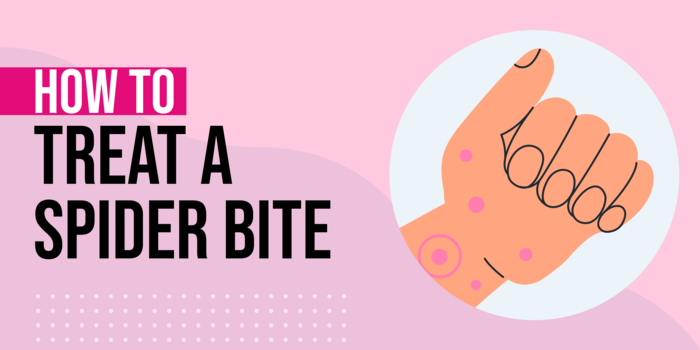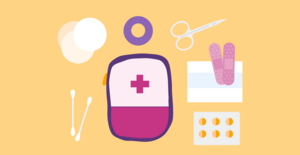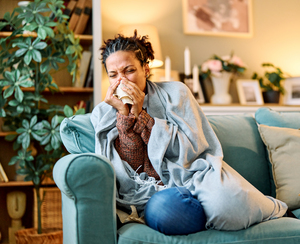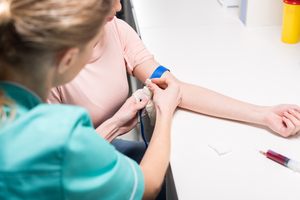Key points
- Identifying the type of spider that bit you can help determine the severity and appropriate treatment.
- Common symptoms of spider bites include redness, swelling, itching, and in severe cases, fever and nausea.
- First aid for spider bites includes washing the area, applying a cold compress, and seeking medical attention if venomous.
- Home remedies for non-venomous bites include baking soda paste, aloe vera, and witch hazel.
- Preventive measures against spider bites include keeping the home clean, sealing cracks, using spider repellents, handling firewood carefully, shaking out shoes and clothes, not leaving shoes or toys outside, and wearing protective clothing.

Spider bites can cause a range of symptoms, from mild irritation to serious medical emergencies—and it's important to know what to do in either case. Below you’ll find tips on how to identify a spider bite, first aid options, and what symptoms need to be checked out by a doctor.
Common Venomous Spiders
If you've been bitten by a spider, it's important to identify the type of spider that bit you. This can help determine the severity of the bite and the appropriate course of treatment. Common venomous spiders in the United States include black widows and brown recluses, according to the CDC. A black widow spider is a black spider with a distinctive red hourglass-shaped marking on the bottom of its hind end, according to the Illinois Department of Public Health. They also note that the brown recluse spider is light brown, with a darker-colored violin shape on its back, according to the
Symptoms of a Spider Bite
Some of the most common symptoms of spider bites include the following, according to the Mayo Clinic:
- Redness and swelling around the bite
- Itching or burning sensation
- Pain or tenderness at the site of the bite
- Small blisters or bumps that may break open and form a scab
While most spider bites are not serious, in some cases (especially with a venomous spider), a spider bite may also cause more severe symptoms such as:
- Fever
- Chills
- Muscle cramps
- Nausea or vomiting
- Headache
What to do if You Have a Spider Bite
If you suspect that you have been bitten by a spider, it's important to take action right away. Here are the first steps you can take to treat a spider bite, according to the Cleveland Clinic:
First Aid for Spider Bites
The CDC lists the following steps for spider bite first aid:
- Stay calm and try to identify the type of spider (if it is possible to do so safely)
- Wash the bite area with soap and water
- Apply a cloth dampened with cold water or filled with ice to the bite area to reduce swelling
- Elevate the bite area if possible
- Do not attempt to remove venom if you were bitten by a venomous spider
- Immediately seek professional medical attention if there is any chance you’ve been bitten by a venomous spider
- Take an over-the-counter pain reliever, such as ibuprofen or acetaminophen, to help manage pain
The Mayo Clinic also notes that taking an over-the-counter antihistamine or using calamine lotion can help if your spider bite is itchy.
Consider Getting a Tetanus Shot or Booster
If you haven't had a tetanus shot in the past 10 years, it may be a good idea to get one, according to the Cleveland Clinic. Spider bites can sometimes lead to tetanus, a serious bacterial infection that affects the nervous system. If it’s been a while since your last tetanus shot or you can’t remember when your last tetanus shot was, the Cleveland Clinic recommends that you talk to your healthcare provider about whether a tetanus shot is right for you.
Soothing Remedies for Non-Venomous Spider Bites
1. Baking Soda Paste
This simple combination is often used to help alleviate itching and reduce inflammation for minor skin irritations, according to Healthline. Innovative Pest Solutions recommends that you mix a small amount of baking soda with water to create a paste, and gently apply it to the bite area.
2. Aloe Vera
Aloe vera is known for its soothing and anti-inflammatory properties, which could help ease irritation, according to Innovative Pest Solutions. They recommend that you extract fresh aloe vera from the leaves of an aloe plant, or use the aloe vera you can purchase over the counter at most retail pharmacies.
3. Witch Hazel
The astringent nature of witch hazel may assist in addressing itching and inflammation, according to Innovative Pest Solutions. They recommend that you apply witch hazel to a cotton ball and softly dab it onto the bite area.
4. Calendula Cream
Derived from marigold flowers, this cream can help soothe irritation and minimize redness, according to Innovative Pest Solutions. They note that you can find calendula cream at some natural food stores or in the homeopathic section at some retail pharmacies.
5. Tea Bags
Tea contains tannins that could reduce inflammation and relieve itching, according to Innovative Pest Solutions. Try moistening tea bags (such as black or green tea) and place them gently on the bite.
6. Honey
According to Innovative Pest Solutions, Honey’s antibacterial properties could support wound healing and offer relief from the bite. They recommend that you apply a small amount of honey to the bite area and cover it with a clean bandage.
7. Oatmeal Bath
Adding colloidal oatmeal to warm bathwater can provide a soothing experience that helps calm irritated skin and alleviate discomfort, according to Innovative Pest Solutions.
8. Peppermint Oil
Peppermint oil may help soothe irritated skin by providing a cooling effect, according to the Cleveland Clinic.
9. Epsom Salt Soak
Epsom salt is often used to help reduce swelling and discomfort for minor skin conditions, according to Innovative Pest Solutions. They note that you can dissolve Epsom salt in warm water and soak the affected area for 15-20 minutes.
When to Get Medical Care for a Spider Bite
Between 1 in 12,000 and 1 in 15,000 people will experience a spider bite each year, according to the Cleveland Clinic. Most of these bites, they note, are not from dangerous spiders. The Cleveland Clinic explains that in some cases, you may not even realize you were bitten by a spider. If you do, most of the time you will be able to care for your spider bite at home.
There are, however, some (rare) cases when venomous spider bites occur. In these cases, the Cleveland Clinic notes that you will likely experience some severe symptoms. Some of these symptoms may include:
- Muscle cramping
- Abdominal pain
- Nausea and vomiting
- Feeling very fatigued (especially in children)
- Body aches
- Change in urine color, especially to a “very dark, cola-colored urine.”
Additionally, the Cleveland Clinic notes that signs of an allergic reaction should also be checked out by a doctor. These symptoms include:
- Feeling short of breath
- Breaking out in hives
- Feeling itchy all over
Remember, it is always better to err on the side of caution when it comes to spider bites—especially if there is a chance that you need anti-venom. Seeking medical care promptly can help prevent complications and ensure a speedy recovery.
How to Prevent Spider Bites
If you want to avoid the discomfort and potential danger of a spider bite, here are some practical tips to help you prevent them, from Kaiser Permanente.
- Keep your home clean and tidy (spiders tend to hide in cluttered areas, so regular cleaning can help keep them at bay)
- Seal any cracks or gaps in your home's exterior to prevent spiders from entering
- Use spider repellents such as insecticides
- Be careful when handling firewood, where spiders often hide
- Shake out your shoes and clothing before putting them on, especially if they have been stored for a while
- Don’t leave shoes or toys outside
- Wear protective clothing like long-sleeved shirts and long pants when working outside or in basements, attics, outhouses, barns, and other dark cool places with little activity
What to Remember About Spider Bites
You should keep your tetanus shot up-to-date and take steps to prevent spider bites. However, if you are bitten by a spider, it's important to stay calm and take action quickly to render first aid to your bite. If you can do so carefully, you should also capture the spider for professional identification. First aid for spider bites includes thoroughly cleaning the bite with soap and water, then using ice and elevation to help reduce swelling.
See a doctor immediately if you are bitten by a venomous spider or start experiencing the following symptoms:
- Muscle cramping
- Abdominal pain
- Nausea and vomiting
- Feeling very fatigued (especially in children)
- Body aches
- Change in urine color, especially to a “very dark, cola-colored urine.”
- Feeling short of breath
- Breaking out in hives
- Feeling itchy all over
FAQs
How can I identify a venomous spider bite?
Venomous spiders like black widows and brown recluses have distinctive markings. Their bites can cause severe symptoms like fever, chills, and muscle cramps.
What are the first aid steps for a spider bite?
First, try to identify the spider. Wash the bite area with soap and water, apply a cold compress, and seek medical attention if venomous.
What are some home remedies for non-venomous spider bites?
Remedies include applying baking soda paste, aloe vera, witch hazel, or calendula cream to the bite area to alleviate itching and inflammation.
When should I seek medical attention for a spider bite?
Seek immediate medical attention if you experience severe symptoms like muscle cramping, abdominal pain, or signs of an allergic reaction such as shortness of breath or hives.
How can I prevent spider bites?
Keep your home clean and tidy, seal any cracks in your home's exterior, use spider repellents, and be careful when handling items where spiders may hide.
How can I prevent spider bites?
You can prevent spider bites by keeping your home clean, sealing cracks, using spider repellents, handling firewood carefully, shaking out shoes and clothes, not leaving shoes or toys outside, and wearing protective clothing.
When should I seek medical attention after a spider bite?
You should seek medical attention immediately if you are bitten by a venomous spider or if you experience severe symptoms.









